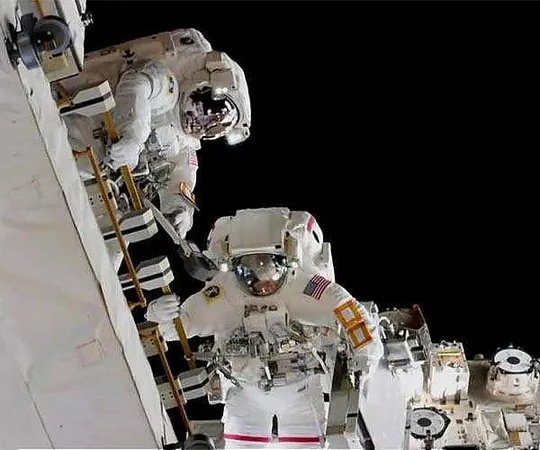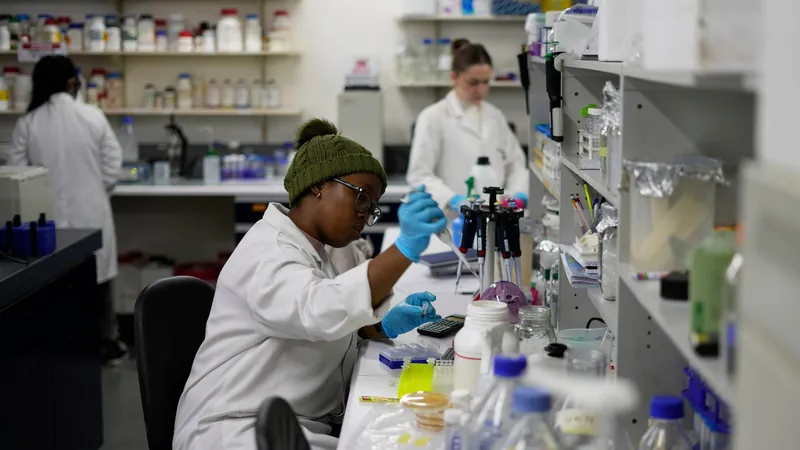
Spacewalk Preparations and Groundbreaking Biology Research Highlight a Busy Week Aboard the ISS
2025-01-13
Author: Li
Spacewalk Preparations and Groundbreaking Biology Research Highlight a Busy Week Aboard the ISS
The crew aboard the International Space Station (ISS) is buzzing with activity as they wrap up yet another productive week. With critical preparations underway for upcoming spacewalks, the Expedition 72 team is also making strides in biotechnology research, which holds promising implications for health on Earth and in space.
Upcoming Spacewalks
On the agenda, two significant spacewalks are set for January 16 and January 23. These missions are aimed at maintaining key research equipment, updating advanced communications gear, and investigating the potential for various microbial life forms existing on the ISS' exterior.
First Spacewalk Details
NASA astronauts Nick Hague and Suni Williams will lead the first spacewalk, dedicating approximately six-and-a-half hours to crucial repairs. Their tasks include addressing a light leak on the NICER X-ray telescope, ensuring the Alpha Magnetic Spectrometer is primed for future enhancements, and replacing vital station orientation and navigation equipment. This collaborative effort is bolstered by NASA Flight Engineers Don Pettit and Butch Wilmore, who engaged in rigorous preparatory discussions and procedural reviews ahead of the maneuver.
Second Spacewalk Goals
The second spacewalk promises to advance the mission further, with two yet-to-be-named astronauts set to step out from the ISS’ Quest airlock. Their mission objectives will be to install a new antenna assembly, continue the search for external microbes, and conduct tests on the Canadarm2 robotic arm. Both spacewalks will kick off around 7 a.m. EST, with live coverage beginning at 5:30 a.m.
Scientific Research and Experiments
Meanwhile, the crew is also focused on an impressive array of scientific research. Hague started his day by processing samples of micro-algae that could potentially serve as a sustainable food source and help generate oxygen for life support systems in spacecraft. Following this, he meticulously downloaded health data related to his cardiovascular exercises performed on the COLBERT treadmill—a crucial aspect for maintaining astronaut health during long-duration missions.
Crew Members' Contributions
Commander Suni Williams, alongside Flight Engineers Pettit and Wilmore, also allocated a portion of their day to essential orbital maintenance tasks. Williams conducted assessments on the fluorescence biology microscope, while Pettit and Hague worked on various plumbing and life support systems.
Research on Adaptation in Microgravity
On the Russian segment of the ISS, cosmonauts Alexey Ovchinin and Ivan Vagner explored how astronauts adapt their vision and balance in a microgravity environment. Flight Engineer Aleksandr Gorbunov utilized his Friday shift to conduct thorough inspections of the station’s piloting and navigation systems, ensuring everything operates seamlessly for the crew.
Conclusion
As the Expedition 72 crew gears up for their spacewalks, their efforts not only contribute to the upkeep of the ISS but also pave the way for innovative research that could enhance human health on Earth and during future space missions. Stay tuned for more exciting updates from the final frontier!



 Brasil (PT)
Brasil (PT)
 Canada (EN)
Canada (EN)
 Chile (ES)
Chile (ES)
 Česko (CS)
Česko (CS)
 대한민국 (KO)
대한민국 (KO)
 España (ES)
España (ES)
 France (FR)
France (FR)
 Hong Kong (EN)
Hong Kong (EN)
 Italia (IT)
Italia (IT)
 日本 (JA)
日本 (JA)
 Magyarország (HU)
Magyarország (HU)
 Norge (NO)
Norge (NO)
 Polska (PL)
Polska (PL)
 Schweiz (DE)
Schweiz (DE)
 Singapore (EN)
Singapore (EN)
 Sverige (SV)
Sverige (SV)
 Suomi (FI)
Suomi (FI)
 Türkiye (TR)
Türkiye (TR)
 الإمارات العربية المتحدة (AR)
الإمارات العربية المتحدة (AR)